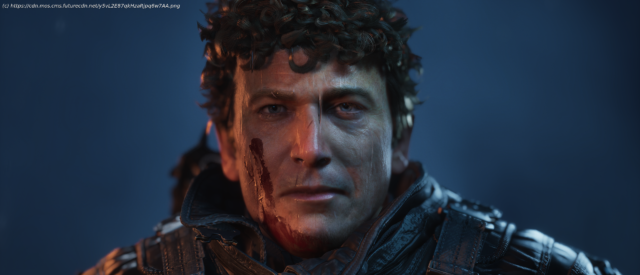It might not be a ‘true’ soulslike, but Hell Is Us takes just the right amount of inspiration from the genre to create something new and interesting.
Another month, another attempt to capture the magic of FromSoft’s genre-defining epic (even if French-Canadian developer Rogue Factor claims it isn’t). Yes, action-adventure game Hell Is Us sits with one foot in the soulslike category, but that’s not a criticism; it takes what it needs from Dark Souls and its ilk, discards what it doesn’t, then absconds in the night with a suitcase full of dodge-rolls and ominous-sounding characters.
See, as a big fan of FromSoft’s games, I’ve come to the conclusion that it’s almost impossible to properly capture the magic of a game like Bloodborne or Elden Ring. Many have tried, and there have been some successes; Lies of P and Remnant II were two recent standout examples for me. I think the trick is not trying to mirror exactly what FromSoft does; it’s taking the formula and doing your own thing with it.
Does Hell Is Us succeed in this regard? For the most part, yes. If you’re a fan of either action-adventure or the best soulslike games — or are curious about getting into the oft-impenetrable latter genre — it’s worth a look. The setting is unique and interesting, the gameplay is enjoyable, and it’s more forgiving overall than most games within the soulslike genre, even if the underlying DNA is impossible not to notice.Hard times
Straight off the bat, this game is bleak — the world you inhabit feels dark and dangerous, poised to collapse into unmitigated chaos at any moment, with only small glimmers of hope left. Wracked by a long and bloody civil war, the setting of Hadea is an insular, vaguely eastern European nation with a rich history of animosity between two religious factions, the traditionalist Palomists and the more progressive (but still pretty damn zealous) Sabinians.
By 1992, the war has reached a fever point, with brutal pogroms, fighting in the streets, and virtually every crime against humanity you could care to list. Seriously, this game is not for the faint-hearted; you’re going to see some pretty visceral evidence of those crimes against humanity.
It’s all rather horrible, but it does have a purpose. Although Rogue Factor didn’t seek to evoke any singular real-world conflict, the setting certainly echoes events like the Bosnian War, the Georgian Civil War, and the Croatian War of Independence. There’s even a thinly-veiled UN imitator called the Organized Nations, characterised by their blue helmets just like in real life. Considering that Hadea is entirely fictional, there’s an unsettling weight of reality to it all that stands as a testament to the quality of the world-building.
Our protagonist, Remi, doesn’t really give a shit about any of this, though. He’s come back to Hadea to find his parents, from whom he was separated as a young child. Naturally, said parents turn out to be entwined in the core narrative. See, that civil war is merely the backdrop; the real meat of the story here concerns an outbreak of bizarre, violent creatures, an ancient religious order, and a mysterious black-ops group doing nefarious things under the cover of Hadea’s present conflict.Uncovering the mystery
The story is told via a framing narrative, which sees Remi — immediately recognisable as Elias Toufexis, best known as the iconic baritone of Adam ‘I Never Asked For This’ Jensen in the newer Deus Ex games — being drugged and interrogated by a deeply unpleasant man with a chainsmoking habit and about sixteen chins. See, Hell Is Us loves its classic environmental storytelling, but it’s also not above using actual cutscenes. There are also proper dialogue scenes with some (non-player characters) NPCs, which serve to both progress the story and deliver optional exposition about the world.
For the most part, I found the characters believable and (usually) likable. From sardonic war journalist Tania to the kind-hearted Abbot Jaffer, these NPCs inject the world with humanity and authenticity. Unfortunately, Remi himself doesn’t have quite the same screen presence. He’s the cold, brooding type, which mercifully does mean that he doesn’t chatter to himself constantly while you’re exploring or solving puzzles, but also results in him feeling a bit flat. Early in the story, it’s revealed that he’s a diagnosed sociopath with a military past, but this seems to serve mainly as a convenient reason to make him largely unbothered by the insanity unfolding around him.
Many of the people you encounter while journeying across Hadea have side-quests to offer you, though this is usually done in a roundabout way; in typical soulslike fashion, there’s no world map or objective markers. Instead, you might hear a soldier complaining about running low on his medication — and wouldn’t you know it, later on, you’ll find a bottle of the very pills he needs. Sometimes, the clock is ticking; I found a woman with a starving infant hiding from Sabinian soldiers, and by the time I returned with some bottles of baby formula, I was met with a shoebox with a pacifier on top. That hurt a little, honestly.
There’s little handholding here, which admittedly had me wishing for a wiki on a few occasions while I was reviewing the game, but it’s not quite as oblique as the average Souls series entry, instead feeling strangely more like a retro point-and-click adventure game. Remi has a chunky tablet device that doubles as an inventory screen and ‘investigation log’, noting down key information you come across and helpfully sorting the stuff you find into quest-critical items and the many, many lore snippets you can uncover.
Often, the pace is slowed by the inclusion of a puzzle, and these range from laughably easy to moderately head-scratching.
Домой
United States
USA — software Hell Is Us is a surprisingly enjoyable and accessible semi-soulslike — just...






